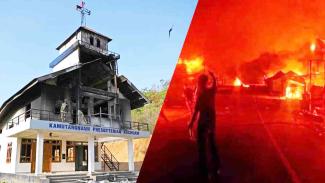Even as the Union Home Minister Amit Shah was warning the Karnataka electorate that a Congress victory in the state would trigger riots, horrific ethnic violence erupted in BJP-ruled Manipur that had all the signs of an orchestrated riot. The Union government, which uses the term 'double engine government' for BJP-ruled states, invoked Article 355 to take over power in double engine-driven Manipur and issue shoot-at-sight order even as the death toll reportedly crossed fifty and the violence spread from the hills to the valley including the state capital Imphal. Even top ranking tribal officials and leaders have had to face the brunt of mob violence and several churches have reportedly been torched. The relative calm that prevailed in the state in recent past has been brutally shattered.
Reports coming from violence-hit Manipur indicate not just a law and order breakdown, but deep cracks in Manipur's delicate social fabric. The immediate trigger behind the current phase of violence was the Manipur High Court order to the State Government to recommend the Meitei community's appeal for inclusion in the ST list to the Union government. The High Court order has now been challenged in the Supreme Court. It is reported that the Supreme Court in its oral remarks has found it beyond the power of the High Court to recommend the inclusion of any group in the ST list. But clearly this one single issue could not have led to such a chain of events without a prior build-up and the current outburst must also draw our attention to the underlying situation in Manipur. Even BJP's own MLAs from tribal background are now blaming the Birendra Singh government of pursuing an agenda of ethnic cleansing.
The demand for inclusion of Meiteis, who are by far the dominant community in Manipur, in the ST list has understandably enraged the Kukis as well as Nagas, Mizos and other tribal communities of Manipur. ST status for Meitis would not only entitle them to the benefits of reservation in education and jobs, it will also give them land rights in the territory currently protected for the tribal communities. As it is, tribal communities are already being deprived of many of their traditional settlements with the declaration of tribal land as protected or reserve forests and wildlife sanctuaries. The Hill Areas Committee, which is supposed to have administrative powers over hill areas has systematically been robbed of its powers.
Adding to the anxiety and anger of the tribal communities of Manipur is the BJP's constant invocation of Assam type NRC for Manipur and the branding of tribal refugees who are driven by adverse circumstances in Myanmar to seek refuge in the tribal settlements of adjoining areas of Manipur hills as illegal infiltrators. The Kukis and other tribal people of Manipur share close kinship ties and ethnic bonding with their tribal counterparts across the border in Myanmar and while the BJP government of Manipur follows a hostile policy towards refugees the tribal communities of Manipur obviously feel sympathy for their own helpless brothers and sisters. The attacks on churches in Manipur, which are in tune with the Sangh brigade's aggressive anti-Christian anti-conversion campaign elsewhere in the country, complete the circle of alienation and marginalisation of the tribes of Manipur in their own homeland.
The BJP claims to be specially committed to the development of the North East. It has seemingly entrenched itself in the politics of Assam with its shrewd combination of communal polarisation and identity manipulation. Next to Assam, the party has managed to retain power for the second successive term in Tripura and Manipur. Its growth in Manipur has been primarily among the Meiteis in the valley but the party has also been pretending to follow a policy of increased tribal outreach with its much trumpeted "Go To Hills 2.0" campaign. The current spate of ethnic violence exposes the true essence of the Sangh brigade's sinister North Eastern game plan. Protection of cultural diversity and the constitutional rights and aspirations of the tribal communities is central to peace, democracy and development in the North East and the BJP's agenda of Hindutva majoritarianism is antithetical to the delicate mosaic of North-Eastern India. The current situation of Manipur should alert us to the ominous implications of the BJP's aggressive agenda and growing domination in North-Eastern India.









